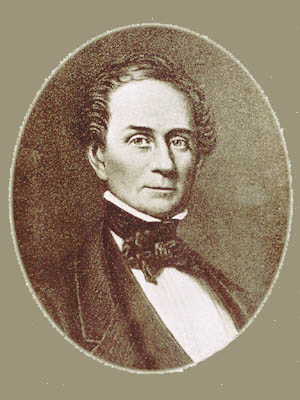- Henry Johnson (Louisiana)
Infobox Governor
name= Henry Johnson
order = 5th
office = Governor of Louisiana
term_start = 1824
term_end = 1828
lieutenant = none
predecessor =Henry S. Thibodaux
successor =Pierre Derbigny
birth_date = birth date|1783|9|14|mf=y
birth_place =Davidson County, Tennessee
death_date = death date and age|1864|9|4|1783|9|14|mf=y
death_place =Pointe Coupee Parish ,Louisiana
party =Democratic Republican ,Whig
spouse = Elizabeth Key
religion = EpiscopalianHenry Johnson (
September 14 ,1783 -September 4 ,1864 ) was the Governor ofLouisiana , and served as a United States Representative and as a United States Senator.Johnson was born in
Davidson County, Tennessee in September, 1783. [deposition of Joe Johnson (Woodville, Miss), thesis of Anna Mae Schmidt, LSU Press(1935)] Other sources indicate he was born in Virginia. The family is said to have resided in southern Virginia, where Johnson became member of Virginia Bar. Johnson was married to Elizabeth Key, daughter of Philip B. Key, a cousin ofFrancis Scott Key .In 1809, Johnson moved to the Territory of Orleans, as Clerk of the Second Superior Court of the Territory. In 1811, he was appointed Clerk of the newly-formed
St. Mary Parish .In 1812, he lost a bid to the U.S. Congress. After his defeat, he practiced law in
Donaldsonville, Louisiana . Upon the death of U.S. SenatorWilliam C.C. Claiborne in 1818, Johnson was appointed to fill his vacancy. He was elected by the legislature to a full 6-year Senate term in 1823 on a promise not to run for Governor in 1824. He did run, however, and was elected Governor the next year. He served as Louisiana Governor from 1824 until 1828.At this time, the legislature moved the seat of government to
Donaldsonville in a compromise between the Anglo-American leaders who wanted the capital out ofNew Orleans and the Creoles who wanted to retain the seat of government within a French area. Riots over this his same issue had forced the resignation of the previously elected Governor,Thomas B. Robertson in 1824.Johnson benefited from a bitter division among the Creoles to get elected, then luckily enjoyed the fruits of a visit to Louisiana by Revolutionary War hero, the
Marquis de Lafayette . That visit allayed the bitter Creole-Anglo split, but Johnson was to inflame the conflict once again by taking the side of the "Anglos" in a dispute about cotton and sugar cultivation.The creation of two financial institutions promoted prosperity during Johnson's term: the Louisiana State Bank and the Consolidated Association of Planters of Louisiana. He improved commerce within Louisiana by forming the Internal Improvement Board to maintain and build roads and canals.
In 1830, Johnson ran for his old Senate seat against
Dominique Bouligny and backedEdward Douglass White Sr. againstEdward Livingston for the 1st District in Congress,John Quincy Adams for President andPierre Derbigny for Governor. While his "ticket" were all elected, Johnson lost his own race for the Senate against Bouligny.He was elected as a Whig to the United States Congress in 1834, upon the resignation of
Edward Douglass White Sr. and he served from 1834-1839.In 1844, Johnson was appointed to fill the vacant U.S. Senate position of the deceased
Alexander Porter who turned down the seat before his death due to poor health. Johnson remained in the Senate for a second time until 1849. As Senator he supported bills favoring annexation of Texas and repealing the tariff of 1846. Johnson lost a bid to remain in the Senate toPierre Soulé , a Jacksonian-Democrat. In 1850, he suffered a final political defeat losing a race for Congress againstHenry Adams Bullard (Whig). Johnson retired toPointe Coupee Parish to practice law.During the Civil War, Gov. Johnson remained in Pointe Coupee Parish, Louisiana, where he died at the close of the war and was buried on his plantation which lies at the juncture of Bayou Grosse Tete and Bayou Maringouin.
According to the thesis of Anna Mae Schmidt (LSU, 1935), in the deposition of Joe Johnson, great-nephew of Gov Johnson, Joe Johnson states that Gov Johnson's body was moved for reburial to Donaldsonville. There is apparently no present-day knowledge of this.
According to Sidney Marchand, "Story of Ascension Parish", Johnson bequeathed the land of the present Ascension Episcopal Church in Donaldsonville (corner Attakapas/Nicholls and St. Patrick Streets).
References
External links
* [http://www.sos.louisiana.gov/tabid/363/Default.aspx State of Louisiana - Biography]
Wikimedia Foundation. 2010.
